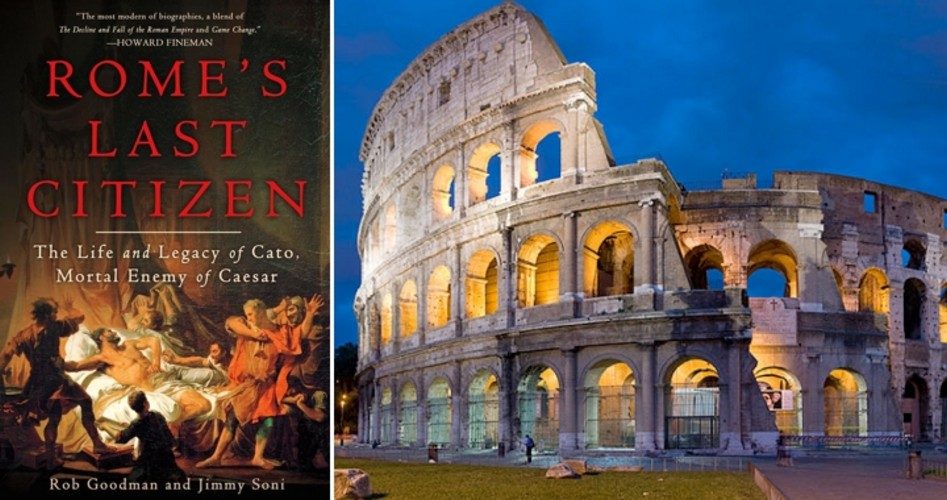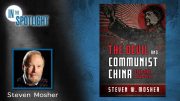
“The victorious cause was dear to the gods; the lost cause, to Cato.” This is the inscription (in Latin) inscribed on the Confederate Memorial at Arlington National Cemetery. It serves to remind visitors not only of the sacrifice of Confederate soldiers who fought and died in the Civil War, but also of the length of the shadow of a man who lived over 2,000 years ago.
Marcus Porcius Cato the Younger is the subject of a new biography by Rob Goodman and Jimmy Soni entitled Rome’s Last Citizen: The Life and Legacy of Cato, Mortal Enemy of Caesar.
Goodman and Soni begin their study of the life of Cato the Younger by relating the high esteem in which he was held by the men and women of the Founding generation. George Washington, for example, inspired the weary battle-worn Continental troops at Valley Forge with a performance of a dramatic retelling of the story of Cato written by Joseph Addison. Many of Washington’s colleagues in the pantheon of American liberty also considered Cato the acme of republican virtues they sought to emulate. The authors write:
Washington’s peers studied and memorized the tragedy. They quoted it, consciously and unconsciously, in public statements and in private correspondence. When Benjamin Franklin opened his private diary, he was greeted with lines from the play that he had chosen as a motto. When John Adams wrote love letters to his wife, Abigail, he quoted Cato. When Patrick Henry dared King George to give him liberty or death, he was cribbing from Cato. And when Nathan Hale regretted that he had only one life to give for his country — seconds before the British army hanged him for high treason — he was poaching words straight from Cato.
George Washington, John Adams, and Samuel Adams were all honored in their time as “The American Cato” — and in revolutionary America, there was little higher praise. When Washington wrote to a pre-turncoat Benedict Arnold and said, “It is not the power of any man to command success; but you have done more — you have deserved it,” he too lifted the words from Addison’s Cato.
So much of this man Cato, who heroically and habitually placed principle above politics, endeared him to the founders of the American Republic. This “Catophilia” was not confined to the new republic’s secular leaders, however. Throughout the new nation, pastors preached sermons praising the virtues of Cato. Take for example this excerpt from a sermon delivered in 1793 by renowned pastor Peter Thacher to an artillery company in Massachusetts:
Why does it hurry me to the field of blood, the place of execution for the friends of American liberty? Whom does it there call me to see led to the scaffold with the dignity of Cato, the fortitude of Brutus, and the gentleness of Cicero marked deeply on his countenance?
Cato’s name was conspicuous among many of the tracts and political pamphlets of the day. Whether in a classroom, at home with a tutor, or simply from a reading of literature, every educated colonial was familiar with and fascinated by the name and the deeds of Cato the Younger.
As recorded above, the founders spoke of Cato in letters and in speeches, they quoted him in diaries and recalled him in dramas. They sought to remember his virtues that thereby they might come to resemble them.
Although not their intention — a biography of Cato would be a very oblique endorsement — much of the authors’ praise of Cato brings to mind a modern statesmen so steadfast in his refusal to compromise for the sake of political advantage that many have dubbed him “Dr. No.”
Regardless of whether one considers his obstinacy to be a virtue or a vice, there is little doubt that in many of this book’s descriptions of Cato one recognizes similar traits in Ron Paul.
Speaking of the Senate of Cato’s day, the authors write that it was “an awesome assemblage of gray-haired eminences, the symbol of Rome’s republican heritage, and a body crippled by personality politics, rigged elections, ritualized bribery, and sex scandals.” Is the Congress where Ron Paul has fought valiantly and often alone for the preservation of our Constitution not similarly plagued?
And: “Cato made a career out of purity, out of his refusal to give an inch in the face of pressure to compromise and deal.” Or:“Roman politics was well-oiled with bribes, strategic marriages, and under-the-table favors; Cato’s vote famously had no price.” And, finally, Cato was “Rome’s most credible voice on the constitution’s sanctity.”
It is difficult to ignore the allusions to an American politician who for decades has displayed nearly identical resistance to the powerful forces whose influence and wealth have silenced other would-be resisters.
Veiled, and almost certainly unintended, references to Ron Paul are not the only types and shadows of modern America found in this book. There are many events recounted in Rome’s Last Citizen that serve as a cautionary tale for Americans weary of our own republic’s moral and economic decline.
Cicero, Cato’s contemporary and notable foe of tyranny in his own right, remarked that the decline of the once noble republic was evident in the fact that “the Roman name is held in loathing, and Roman tributes, tithes, and taxes are instruments of death.” Does this lamentation not accurately describe a world where Americans are heavily taxed and that money is then sent overseas to court the fidelity of allies who often have used that money to purchase weapons that have killed American soldiers sent to “liberate” the people from dictators? What about the thousands of men and women killed as a result of President Obama’s drone war? Do they not hold the name of the United States in loathing as a result of our president’s use of taxes to purchase fleets of drones that daily deliver death to scores of targets who pose no credible threat to our national security?
At this point in their story, Goodman and Soni relate the violence and bloodshed of the tyranny of Sulla. Sulla is infamous for having compiled a proscription list — a list of names of those he considered enemies of the state and who could be killed without recrimination. Again, reading the authors’ description of Sulla is eerily familiar to modern Americans. Of Sulla they said, he was “feared like a king, free to dole out spoils like a king, and like a king, able to kill with a word.” The similarity of such a scenario to our own time is unsettling.
It was not despotism in dictators alone that drew Cato’s ire. He also saw in his own Senate a class of politicians who “always valued [their] mansions and villas, [their] statues and pictures, at a higher price than the welfare of [their] country.” Is this not an apt description of the self-seeking crony capitalism that keeps America at war and keeps the lawmakers who clamor for constant combat comfortably situated in their seats of power?
This well-crafted retelling of the life of Cato ends with a backhanded slap at Cato for failing to embrace “successful compromise” and build coalitions upon which politics is founded. The authors ask: “If the Republic was in the crisis that Cato described, wasn’t it worth a more-than-ordinary effort?” Cicero expressed similar frustration: “When affairs demanded a man like [Cato] for office, he would not exert himself nor try to win the people by kindly intercourse with them.”
Cato could not be bought, he could not be cajoled, he would not compromise, and he “would not recognize a tyrant’s legitimacy by accepting his power to save.”
In the end, perhaps the lesson we, the heirs of Rome’s republican past, learn from the life of Cato is that we are a generation who sadly will find it difficult to “rebuild a freedom [we] had only known from hearsay.”
There is time, however, to save this republic and deflect it from the trajectory toward tyranny upon which it has been set by enemies of liberty. As one writing under the pseudonym Cato wrote before the days of the War for American Independence:
“Thus it is that liberty is almost everywhere lost: Her foes are artful, united, and diligent; Her defenders are few, disunited, and inactive.”
If we are to be victorious and succeed where Cato failed, we must be learn to be united and active in the defense of liberty and the Constitution.



